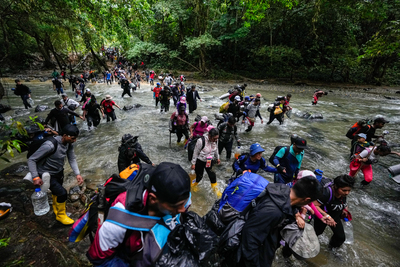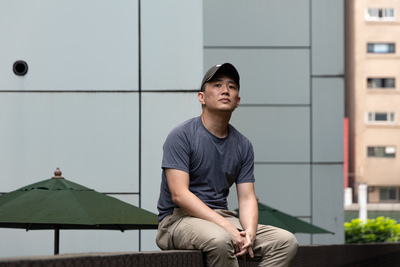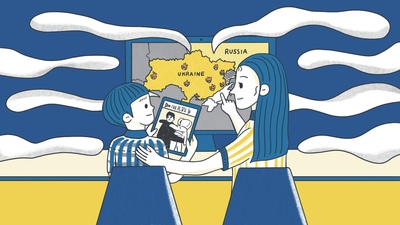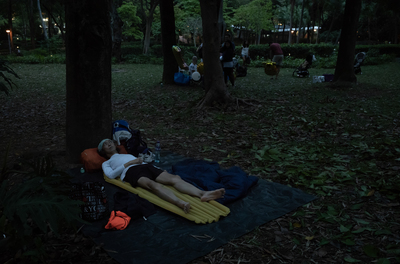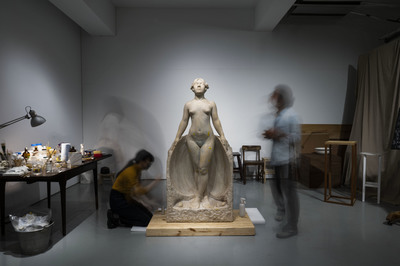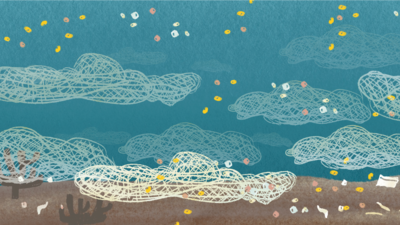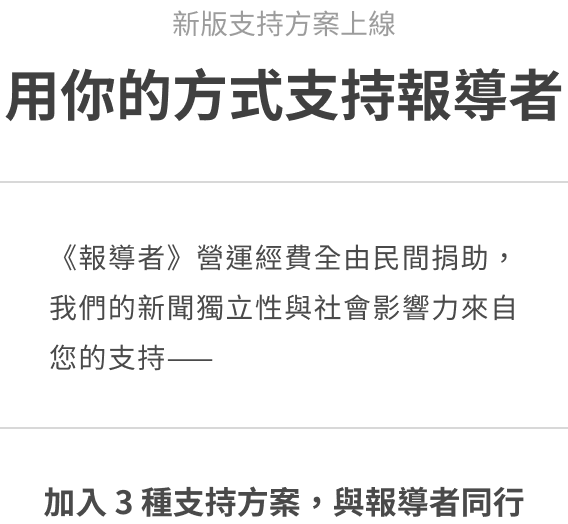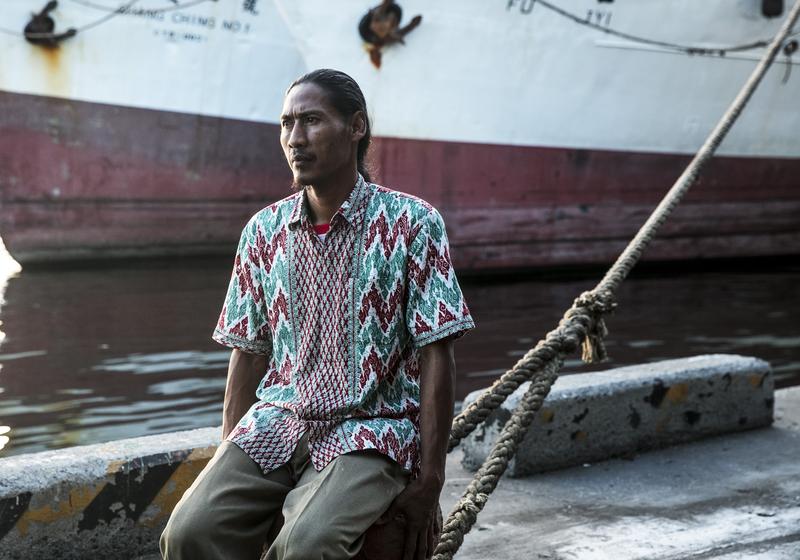
In late August 2015, Indonesian fisherman Supriyanto died on a Taiwanese distant water fishing vessel, only three months after setting sail. December 15, 2016, The Reporter published the series “Fraud, Exploitation, and Blood on the High Seas,” tracking this case of “death from illness” which the Pingtung District Prosecutors Office speedily concluded within two months, unveiling the suspected mistreatment on the vessel, and the process of trafficking Indonesian fisherman to Taiwan by the shipowner and an agency. After the Control Yuan’s correction and the press' numerous reports, Pingtung District Prosecutors Office soon relaunched the investigation.
In May 2018, one and a half years after, the investigation showed progress. Under the assistance of labor unions from both Taiwan and Indonesia, a fisherman who worked on the same vessel with Supriyanto arrived in Taiwan and gave testimony in court. The testimony not only helped the prosecutor clarify the situation on board then, but also became one of the few successful callings of a foreign witness in the criminal cases.
This was the second time Sukhirin came to Taiwan, three years after his first visit.
In May 2015, Sukhirin was hired as a fisherman by a Taiwanese distant water fishing vessel, Fu Tsz Chiun (福賜群號), from Donggang, Pingtung. There were two Taiwanese officers and nine Indonesian fishermen on this small-size longline vessel, navigating to the Pacific Ocean for tuna fishing. On September 9th of the same year , the vessel returned to the harbor without finishing the projected two-year sailing.
Two Indonesian migrant fishermen died within three months after setting sail. Urip fell into the water due to the stormy waves, while the other fisherman Supriyanto, reported by the Captain Chen Kai-Chih (陳凱治), died of illness. Chen said the vessel returned homeward in order to send the corpse ashore.
Pingtung District Prosecutors Office concluded that Supriyanto died due to illness, and there was no suspicion of murder. The cause of death was “falling off when hanging clothes and injuring knees. The wounds were infected by bacteremia which eventually led to septic shock and death.”
According to the autopsy report, Supriyanto–43 years old then–had almost half palm-sized wounds on both knees, where the bacteremia infection was present, leading to septic shock and death. The report also said there were bruises on Supriyanto’s ears, arms, back, knees and toes, and he was suffering from severe malnutrition when he died.
Three video clips shot by Supriyanto’s crewmate, Mualip, made the cause of his death even more suspicious. In the videos, Supriyanto’s head was dripping blood; his eyes were red, swollen and bloodshot. He said,“the captain beat me, and abused me.”
Sukhirin said he and Supriyanto were the closest when they were onboard. They were similar in age, and both middle-aged when they left their country for seafaring with the vision of fighting for their lives once again. People in their hometown, the offshore of Middle Java, said it was great for them to work abroad; once they earned enough money, they could build a new house for their families to live a better life. Sukhirin and Supriyanto even promised to visit each other’s home after the contracts ended.
Sukhirin seemed to be essential since he was the first witness from the crew who was called to testify after the reinvestigation had been launched.
Control Yuan member Wang Mei-Yu (王美玉) began investigating this case in 2016. She found that the interpreter assigned by the Pingtung District Prosecutors Office didn’t understand Indonesian Middle Javanese and failed to completely translate Supriyanto’s account in the videos of how he had been mistreated. Wang said the videos weren’t taken seriously despite the fact that “the videos were his last accusations before he died.” She believed that the previous investigation carried out by the Pingtung District Prosecutors Office was problematic; they had never examined if Supriyanto’s death was the cause of mistreatment, and never examined the captain’s negligence or violation of duty of care under the unique conditions on the fishing vessel.
Furthermore, besides the videos, there were also witnesses that the captain had abused the fisherman, leading to his death. When they were interrogated by the police officers and prosecutors after the vessel anchored, crew members mentioned how the captain, chief engineer, and two other sailors mistreated Supriyanto.
“The captain, chief engineer, Agus Setiawan, and Munawir Sazali; these four people had beaten him up. I saw it.”
“Supriyanto was often beaten by the captain and chief engineer with tools. They accused him of often dozing off. They hit his ears and head…I didn’t see how (his knees) were hurt, but they were swollen.”
“(other fishermen) had beaten Supriyanto, slapped his mouth causing him to fall, hit his head where he started bleeding…the captain abetted it.”
“(what caused injuries on the death’s knees?) I don’t know. I only know that they were caused by the captain.”
The Pingtung District Prosecutors Office asserted that the majority of the evidence was in support of the fact that the captain did not have an intention to abuse or assault the crew member then. But this time, the office–requested by the attorney Tseng Wei-Kai (曾威凱)–summoned the foreign witness who had returned to Indonesia, hoping to clear up the truth.
To date, both domestic and international human rights and environmental organizations were still highly concerned about Supriyanto’s death. On May 24, 2018, Greenpeace reported that, by comparing the data from Global Fishing Watch about the vessel routes, they found Fu Tsz Chiun continuing to fish as usual when Supriyanto was dying and even after his death. The finding was inconsistent with the assertion that “they’ve returned immediately,” made by the agency and the captain. Thus, whether the captain had exercised the duty of care was questionable.
“There is little evidence, only three videos, so the witness is very important,” said Chuang Shu-Ching (莊舒晴), a member of Taiwan International Workers’ Association (TIWA) who was assisting the appeal. They submitted the request of summoning a witness in November 2017 and simultaneously began searching for the witness. The other seven fishermen working on Fu Tsz Chiun were deported on September 17th, 2015. Some of them were hard to contact since they went working on other fishing vessels after returning home.The summoning process was challenging.
Under the assistance from local human rights and fisher organizations, TIWA finally found Sukhirin. However, Sukhirin did not agree to be a witness at first; not until receiving the subpoena in late April 2018 and after continuous persuasion, did he finally decide to come to Taiwan and testify in court.
“I have never met the witness before. He even thought it was a scam when our interpreter phoned him. When I picked him up at the Taoyuan airport, that was the first time I saw him,” Chuang said. Although TIWA was the assisting association in this case, they were complete strangers to the witness. Sukhirin was living in a rural area in middle Java where residents had to travel to Jakarta to apply for the visa and relevant documents. He could not afford the transportation expense and was incapable of handling the procedures independently.
Director Prosecutor Lin Chun-Chieh (林俊傑), the spokesman of Pingtung District Prosecutors Office, explained that, in general, the Ministry of Justice would be in charge of summoning foreign witnesses and exercising the international administrative and legal assistance. The process takes a longer time, and success or failure depends on the diplomatic relationship between the two countries and whether or not the requested country is willing to collaborate. In this case, Lin said he did not closely follow how the prosecutor–the undertaker of the investigation–resolved and successfully brought the witness to Taiwan.
Prosecutor Cheng Tzu-Wei (鄭子薇) of Taiwan Ciaotou District Prosecutors Office, who had investigated multiple cases involving foreign affairs, said she rarely handled cases calling a foreign witness from other countries to testify on court in Taiwan. She explained that the jurisdiction of Taiwan is not exercisable in foreign countries. In light of this, the summons is not compulsory–if the witness refuses to stand on the court regardless of the summons, the court can only arrest or charge a penalty, but cannot go abroad to arrest or compulsorily enforce the summons. Once the foreign witnesses return to their home country, it would be nearly impossible to summon them again. Cheng said, “usually we give up summoning and treat it as the witness’ inability to appear in court. Therefore, in terms of the case of migrant workers, the initial record written by the prosecutor is especially essential.”
Although TIWA had assisted cases regarding the migrant labor in Taiwan for a long time, Chuang could only think of one similar case in which the Taoyuan District Prosecutors Office also asked for help from TIWA to find the foreign witness. However, unlike the previous case, the Taoyuan District Prosecutors Office was willing to pay for the witness’ traveling expenses, but Pingtung office who’s in charge of Supriyanto’s case only reimbursed 1,500 NTD for the witness attendance fee; to afford other costs such as the flight and accommodation, TIWA had to fundraise online.
According to relevant regulations, if the witness is abroad, the district prosecutors office shall pay for the travel expense, reimbursing the actual cost. Nonetheless, the prosecution office in different districts addresses the payment variously. Even if the litigant or assistance groups are able to find the witness, they still face pressure of how to pay the fee.
Physical distance was not the only factor preventing Sukhirin from willing to take the role of witness. When communicating with Sukhirin, Chuang noticed that his hesitancy came from the resistance by heart.
“This case catches the spotlight not only from Taiwanese press, but the international media as well. They went to interview him (Sukhirin). Sukhirin believes they are making money by shooting him. He feels unfair because he is a victim as well,” Chuang said. To earn his trust, TIWA even asked a member from the local fisherman organization to come to Taiwan with Sukhirin and help him retrieve his arrears and passport held by the former agency.
Like most men from the coastal Middle Java, Sukhirin used to work in the fishing industry in Bali, working part-time. Back then, introduced by relatives, Sukhirin spent 200 thousand IDR (approximately 500 NTD) at the agency, which got him an opportunity to work on a Taiwanese distant-water fishing vessel. The agency helped him apply for documents and process paperwork; even without experience fishing abroad, he was able to set off within just five days.
Introduced by the same Indonesian agency, Sukhirin met Supriyanto after going on board–he was a quiet, friendly and honest guy.
According to the contract signed with the agency, Sukhirin should receive 9,600 NTD (approximates to $310) every month, but after deducting the deposit and actual cost, which the agency used to apply for the documents, he only received 2,100 NTD in the first month. After working onboard for two years, 30,000 NTD was taken away from his wages as the deposit which he can only get back once the contract is due.
Moreover, the contract also said he had to obey the captain, which permitted the captain to send him back if the captain considered him incapable of working–he would have to pay for his own travel expenses. If he made errors, slacked off, or asked to return home, the consequence would affect his family and they could be asked to pay as high as 30,000 NTD in penalties to the Indonesian agency.
While being interviewed, Sukhirin said he did not remember how much he had earned because he gave it to his wife. However, because he did not finish this distant-water fishing trip, he failed to achieve the dream of saving money to start a small business in his hometown. Now, Sukhirin continuously works as an unskilled laborer to support living; sometimes he catches wild birds and sells the birdcages he weaves. He earns 100 to 200 NTD per day, and he finds life barely tolerable.
After the incident, Sukhirin had never thought to work for Taiwanese fishing vessels, and he was even reluctant to come to Taiwan again. This time, he came to Taiwan only because he couldn’t accept Supriyanto’s death being treated unfairly by the Taiwanese judicial system.
“I don’t want this to happen to any other (Indonesian) worker…,” Sukhirin said, hopelessly and tiredly. In the few days in Taiwan, under the organization’s arrangement, he accepted several interviews. Not only was he speaking for himself, but it was also for his crew members and thousands of other Indonesian fishermen currently working on the ocean.
In an interview with The Reporter, Sukhirin recalled the time in 2015 when working on the Fu Tsz Chiun. He said after arriving at the fishing ground, they had to work in shifts ceaselessly and rested one or two hours every day. Everyone was tired and Supriyanto often dozed off because of overworking. Also due to the competitive environment onboard, his performance was especially inefficient. Other people despised him and felt burdened by him. Yields were unstable then, and on days when the yield was bad,the captain would only allow the crew to have one meal as punishment for that day.
When being interrogated by the prosecutor in 2015, Sukhirin had already said there were also two other Indonesian fishermen assaulting Supriyanto besides the captain and chief engineer. The captain hit Supriyanto’s head by hands or with tools, and the fatal injuries on the knees were caused by the captain as well.
After the distant-water fishing vessels set sail, the fishermen on board face only a boundless sea; the confined and challenging environment is unimaginable for people on land. In an interview with The Reporter, a sailor who used to work longlining tuna fishing said the job was inhumane. In the two-year term, the only target is full-load. Fishermen had to work in shifts over a period of 24 hours, dropping and retrieving the hook in order to fish. When there were high volumes of fish, they would only sleep 2 hours per day and sometimes even fall asleep while standing up despite how shaky the ship was, or how rough the waves were.
Under the intense and heavy pressure of fishing, plus the language and cultural barriers between Taiwanese officers and migrant fishermen, violence on the ocean is often heard. According to the statistics from the Fisheries Agency, there were 23 bloodshed cases committed by migrant fishermen in the past ten years. However, there were no statistics about mistreatment, killings, deaths, missing persons cases, and injury of the migrant fishermen on the distant-water fishing vessels. Through interviews with the agencies, captains, coast guards and coast observers, these people who have all been on board seem to know that the mistreatment toward migrant fishermen occurs more often than the murder of the captain.
On May 7, the date when Sukhirin stood on the court, he showed the scar on his right-hand little finger to a journalist from The Reporter. The wound, an injury from working on the distant-water fishing vessel, was still painful and numb. He was beaten by the captain when he felt seasickness, and along with physical violence was obscene language. “Fuck your mother” was one of few words he learned when he worked on the Taiwanese fishing vessel.
One and half years had passed since the Pingtung District Prosecutors Office relaunched the investigation. Lin, the director prosecutor of the office, said they had addressed the parts of the investigation that the Control Yuan corrected. With regard to the progress of investigation, he said he respected how the prosecutor in charge was handling the case.
(To read Chinese version of this article, please click: 真相之路有多遠──印尼漁工之死重啟調查,關鍵證人跨國現身)
用行動支持報導者
獨立的精神,是自由思想的條件。獨立的媒體,才能守護公共領域,讓自由的討論和真相浮現。
在艱困的媒體環境,《報導者》堅持以非營利組織的模式投入公共領域的調查與深度報導。我們透過讀者的贊助支持來營運,不仰賴商業廣告置入,在獨立自主的前提下,穿梭在各項重要公共議題中。
你的支持能幫助《報導者》持續追蹤國內外新聞事件的真相,邀請你加入 3 種支持方案,和我們一起推動這場媒體小革命。

